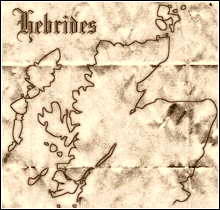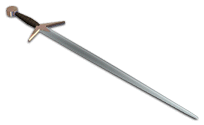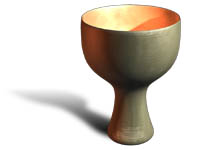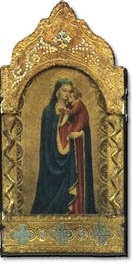
|
Part Three: The Morrisons of the Outer Hebrides by Andrew Morrison
What does it mean to say that a name has a real Morrison air to it? Are there characteristic Morrison occupations or professions? The question may sound absurd to a modern ear, but in ancient societies many professions were hereditary, the son acting as apprentice to the father. First let me say what professions we have not typically followed: we have no great tradition in commerce or in war. There is a big cafeteria chain headquartered in Mobile, Alabama, called Morrisons. But, while its founder gave the business its name, all the shares are owned today by the descendents of his friendly local banker, a Mr. Outlaw. As for war, the so-called "manly Morrisons" have generally acquitted themselves creditably when called upon to do so, but have not pursued war for its own sake or as a vocation. Ironically our best-known "soldier" is probably Marion Morrison, i.e. the actor John Wayne, who in the popular imagination won every major battle from the Alamo to the Pacific. In reality, he found in Hollywood an excellent way to avoid actual fighting.
Instead we are known as lawyers, doctors, priests and ministers, poets and songwriters, educators and blacksmiths. To quote the 19th century Gaelic scholar and collector, Alexander Carmichael:
"The Morrisons have been celebrated throughout the ages for their wit, poetry, music, philosophy, medicine and science, for their independence of mind and sobriety of judgement" (Crofting and seafaring also go with the territory.) Putting it all together, we like to study, to be consulted and to give out opinions or judgements sonorously in the confident expectation that the soul, the body or the body politic will be transformed for the better. (We still produce Governors too, not just the first and second Viscounts Dunrossil, in Australia and Bermuda respectively, but more recently Jim Gilmore became Governor of Virginia and wore the clan colours to his inauguration.) I believe there is a common thread to these occupations which can be traced back to ancient Ireland. The Druids (like the Aes Dana or filidh) were a hereditary caste of scholar-priests, who might also fulfil the roles of doctor, judge, philosopher, and ambassador. Like the Brahmins in India, they were the educated elite, advisors to kings, exempt from military service and not allowed to own land. With the advent of Christianity many became priests or abbots in the Celtic Church, still dishing out advice to kings and commoners alike, arbitrating disputes, curing the sick and writing poetry. Little is known about St. Moluag, but it is notable that his contemporary, St. Columba, embodies so many of these characteristics. In a surviving poem he even refers to Christ as his Druid. So, after 1600 when we couldn't be brieves any more, why should we not return to being priests and ministers? Almost every Morrison seems to have a minister in the family or at least the family tree. At the funeral on North Uist of Dr. John Morrison, the chief, there were three ministers: one Church of Scotland, one Wee Free, and one English speaker for the benefit of relatives who'd lost the "old tongue". Coincidentally, two were Morrisons and the other's mother was a Morrison. Again in Compton MacKenzie's hilarious book, Whisky Galore, the names are all changed to protect the guilty: North and South Uist become Greater and Lesser Todday and Benbecula, Mid Uist. But even here the minister on the Protestant isle is a Morrison!
So Pabbay, the priests' isle, makes sense even today. But what of the blacksmiths you noticed lurking in my list?
It was the art of the blacksmith which transformed the ancient Celts as a people and first allowed them to dominate the continent of Europe in classical times. Through the old myths we can begin to glimpse the increasingly symbolic role smiths played in Celtic society, together with the weapons, cups and cauldrons they forged (Excalibur, the Grail etc.). It was the smith god Goibhniu (brother of Cian) who gave immortality to the gods. The great heroes (Finn, Cormac, Cuchulain, the judge Morann), even the god Lugh (son of Cian, father of Cuchulain), all served apprenticeships to smiths or married their daughters. One may reasonably speculate that the MacLeods were quite aware of all this when they appointed the Celtic, priestly Morrisons to be their hereditary armorers. That they were impressed with the magic of the Gaels can be seen from the prominent place given to the Fairy Flag in the history of Dunvegan. And to imagine the symbolic importance of armor to a superstitious warrior, one need only consider the practices of modern athletes, and in particular their fetishistic attitudes to clothing and equipment! The point here is that smiths, like priests, practiced an ancient art involving the transformation of base material and an initiation into new life, while the weapons they made empowered, enriched and preserved life. How appropriate that "An Nuadh Breith" (new life) is the title of one of Iain Gobha's poems!
My belief, then, is that Morrisons were not just Gaelic rather than Norse, but that in the predominantly Norse Long Island they were regarded as the guardians of the old Gaelic lore and Brehon Law, the local experts first on the old magic of the Celts and later on the new magic of Christianity. Despite centuries of inbreeding in those insular communities, the characteristics we have discussed are all more or less diluted today. It is interesting to reflect, however, that whenever we catch ourselves being scholarly, spiritual, speculative, poetical; when we play the advocate or consultant of some kind, or when we are merely opinionated; if we turn our creative energies to some modern equivalent of the smith's art, like engineering; or simply when we find ourselves accused of being too fond of the sound of our own voices, we may in some way be echoing our ancestors, drawing on Morrison genes. Would you rather be descended from cattle rustlers, gang-leaders and warlords? For a Morrison, atavistic is good! Meet the author, Andrew Morrison
Back to The Morrisons of the Outer Hebrides, Main Page |
Thursday, December 26th, 2019
Attention visitors: Tartans.com is back. Please note that this is a snapshot of the site as it existed nearly 20 years ago and you may encounter broken links; we are still combing through the site and correcting those as we find them. Please also note that some sections are currently not functional, primarily the discussion forums/clan chat boards.
|
** HOME - First Time Visitors - Glossary - - Contact Us ** Awards | Bibliography | Clan Calendar | Clan Chat | Clan Finder | History | Famous Scots | Genealogy | Great Hall of the Clans | Links | News and Features | Scots on the Net | Search | Site Map The Gathering of the Clans
Copyright 1995- Tartans.com - All Rights Reserved. |
 That is why surnames like Miller, Taylor, Farmer or Smith arise. In the Hebrides the MacVurichs (or Curries) and MacBeths (or Beatons) were hereditary bards or healers and the MacAskills were the ferrymen across the Sound of Harris.
That is why surnames like Miller, Taylor, Farmer or Smith arise. In the Hebrides the MacVurichs (or Curries) and MacBeths (or Beatons) were hereditary bards or healers and the MacAskills were the ferrymen across the Sound of Harris.
 Morrisons of Pabbay became the hereditary armorers of the MacLeods. To a modern mind there is something incongruous or at best coincidental about Iain Gobha, the Smith of Harris, being both evangelical poet and armorer, wordsmith and blacksmith. However, I believe this would have made perfect sense to the Celts. A prayer attributed to St. Patrick invokes divine protection against "the spells of women, smiths and druids".
Morrisons of Pabbay became the hereditary armorers of the MacLeods. To a modern mind there is something incongruous or at best coincidental about Iain Gobha, the Smith of Harris, being both evangelical poet and armorer, wordsmith and blacksmith. However, I believe this would have made perfect sense to the Celts. A prayer attributed to St. Patrick invokes divine protection against "the spells of women, smiths and druids".
 And from the story of Niall of the Nine Hostages, progenitor of the Irish Royal dynasty, Alwyn and Brinley Rees uncovered traces of initiation ceremonies conducted by smiths, during which boys were reborn as warrior kings, having gone through a ritual baptism of fire with the forge as womb.
And from the story of Niall of the Nine Hostages, progenitor of the Irish Royal dynasty, Alwyn and Brinley Rees uncovered traces of initiation ceremonies conducted by smiths, during which boys were reborn as warrior kings, having gone through a ritual baptism of fire with the forge as womb.
